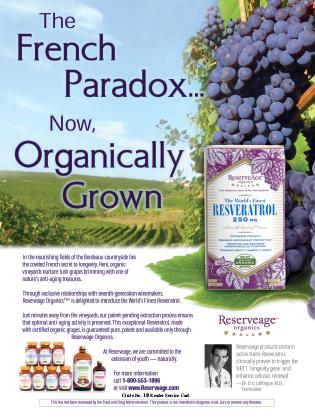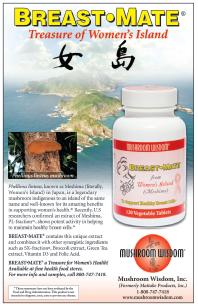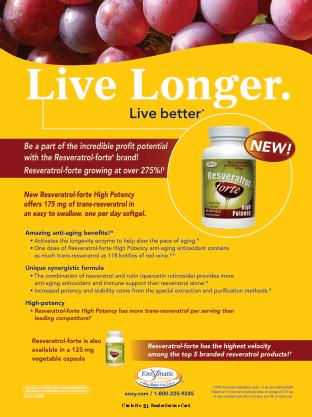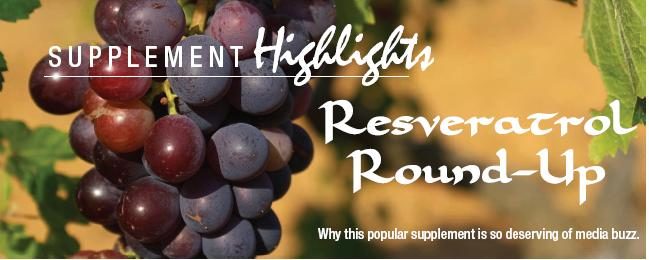In November 2006, a research team lead by David Sinclair from Harvard Medical School made a head-turning announcement: a natural compound called resveratrol had increased the “lifespan and ‘healthspan’ of obese mice,” and was shown to offer “survival benefits in mammals” for the first time. According to the group, which published its data in Nature, obese mice that were fed a high-calorie diet plus resveratrol had increased insulin sensitivity, decreased glucose levels and healthier heart and liver tissues, all of which can be beneficial for preventing type-2 diabetes, heart disease and cancer, the group stated.
In November 2006, a research team lead by David Sinclair from Harvard Medical School made a head-turning announcement: a natural compound called resveratrol had increased the “lifespan and ‘healthspan’ of obese mice,” and was shown to offer “survival benefits in mammals” for the first time. According to the group, which published its data in Nature, obese mice that were fed a high-calorie diet plus resveratrol had increased insulin sensitivity, decreased glucose levels and healthier heart and liver tissues, all of which can be beneficial for preventing type-2 diabetes, heart disease and cancer, the group stated (1).
Though nutritionists had long known of the benefits of resveratrol, it may very well have been this research that ushered in a renewed sense of excitement for this important nutrient.
Resveratrol Goes a Long Way
Resveratrol is found in several plants, most notably in grapes, peanuts and Japanese knotweed (Polygonum cuspidatum). This potent antioxidant is particularly concentrated in red grape skin, seeds and vines, where the predominant form is trans-resveratrol. According to one industry resveratrol specialist, this active form of resveratrol polyphenol is said to “activate the SIRT1 longevity gene and enhance cellular productivity” (2).
 The activation of the longevity gene may be one of the most intriguing findings in recent resveratrol research. The SIRT1 (sirtuin) enzyme helps keep cells healthy over long periods of time, helps block inflammation and is key for calorie restriction. Resveratrol is said to mimic this action, which is linked to longevity due to less cellular damage from toxins, increased insulin sensitivity, lower body weight and reduced cholesterol levels (3).
The activation of the longevity gene may be one of the most intriguing findings in recent resveratrol research. The SIRT1 (sirtuin) enzyme helps keep cells healthy over long periods of time, helps block inflammation and is key for calorie restriction. Resveratrol is said to mimic this action, which is linked to longevity due to less cellular damage from toxins, increased insulin sensitivity, lower body weight and reduced cholesterol levels (3).
When activated by resveratrol, SIRT1 also regulates heat shock factor 1 (HSF1), which keeps cell protein functional when it becomes damaged. Regulating this pathway is said to benefit cell health and longevity. A group from Northwestern’s Weinberg College of Arts and Sciences made this finding in 2009.
“When SIRT1 levels are high, you are in a high-protection mode,” said Richard I. Morimoto, professor of biochemistry who led the research team. He added, “Ironically, triggering the stress response and perhaps maintaining the cell in a protective state over a long period of time can keep cells healthy. The cell is protected against an accumulation of damage when HSF1 is more active” (4).
From an inflammation standpoint, a 2009 small animal study indicated that resveratrol uses a “one–two punch” to stop the body from making sphingosine kinase and phospholipase D, which both trigger inflammation (5). Stopping inflammation also contributes to resveratrol’s helpful effects on a variety of health conditions.
Getting to the Heart of the Matter
The cardioprotective benefits of resveratrol may be one of the most well-known attributes of this antioxidant. Most readers have heard of The French Paradox, a term coined by Serge Renaud from Bordeaux University in 1992. The French Paradox refers to the fact that there’s a low incidence of heart disease and obesity among the French even though their diet includes a lot of wine and rich, fatty foods. Some believe that resveratrol is partly responsible for this, as the antioxidant may help curtail blood vessel damage, prevent blood clots and reduce bad cholesterol (6).
 One reason may have to do with its effect on plaque formation in the arteries. One can consider this benefit in the aspirin-for-heart health arena. The medical community believes that aspirin benefits those at risk for a heart attack because it inhibits platelet activity, which plays a role in making plaque. Researchers say resveratrol also suppresses platelet aggregation by stopping certain signal transduction pathways, which could account for its protection against heart disease. The link between resveratrol and cardioprotection may also run deeper as the antioxidant is said to inhibit cyclooxygenase-1. Of note, some patients that are said to be unresponsive to aspirin react positively to resveratrol’s heart protective effects (7). Consumers on blood thinners, however, should consult a doctor before taking resveratrol as it may increase their effect.
One reason may have to do with its effect on plaque formation in the arteries. One can consider this benefit in the aspirin-for-heart health arena. The medical community believes that aspirin benefits those at risk for a heart attack because it inhibits platelet activity, which plays a role in making plaque. Researchers say resveratrol also suppresses platelet aggregation by stopping certain signal transduction pathways, which could account for its protection against heart disease. The link between resveratrol and cardioprotection may also run deeper as the antioxidant is said to inhibit cyclooxygenase-1. Of note, some patients that are said to be unresponsive to aspirin react positively to resveratrol’s heart protective effects (7). Consumers on blood thinners, however, should consult a doctor before taking resveratrol as it may increase their effect.
Other research suggests that resveratrol’s antioxidant benefits may support heart health on several levels thanks to its effects on various direct and indirect mechanisms. First, it may improve vasodilation by restoring nitric oxide (NO) bioavailability. NO helps relax blood vessels and improve blood flow to the heart; loss of NO bioavailability can lead to increased platelet activation. In addition, resveratrol’s inhibition of NF-kB may help reduce inflammation that could cause heart and vascular problems (7).
A Brainy Nutrient
Resveratrol’s link to plaque prevention isn’t just about heart health; many in the health industry are excited about its potential for reducing the plaque found outside neurons (nerve cells within the brain). Those with dementia or Alzheimer’s disease have large amounts of such plaque in their brains.
In a recent in vitro study, trans-resveratrol “markedly” lowered intracellular and secreted beta-amyloid peptides. This is important because these peptides are responsible for plaque build-up in the brain. Resveratrol helps on this front by stimulating the breakdown of beta-amyloid peptides through the proteasome (a part of cells that can digest proteins) (8).
 A 2009 small animal study puts some numbers behind this connection. Mice given resveratrol for 45 days had large reductions in plaque formation in various parts of the brain: medial cortex (down 48%), stratium (down 89%) and hypothalamus (down 90%). Given these findings, the authors suggest that resveratrol, which protects against beta-amyloid plaque formation, may delay the onset of certain neurodegenerative diseases (9).
A 2009 small animal study puts some numbers behind this connection. Mice given resveratrol for 45 days had large reductions in plaque formation in various parts of the brain: medial cortex (down 48%), stratium (down 89%) and hypothalamus (down 90%). Given these findings, the authors suggest that resveratrol, which protects against beta-amyloid plaque formation, may delay the onset of certain neurodegenerative diseases (9).
Darting Diabetes
Those with diabetes may also benefit from resveratrol. In fact, the antioxidant is said to improve insulin sensitivity in mice. Data released just a few months ago again links resveratrol’s anti-diabetes effects with its activation of sirtuins in the brain, which may be behind its calorie restriction benefits as stated previously. “We know that sirtuins are expressed in parts of the brain known to govern glucose metabolism, so we hypothesized that the brain could be mediating resveratrol’s anti-diabetic actions,” said Roberto Coppari, Ph.D., of the University of Texas Southwestern Medical Center and co-author of the study (10).
The group injected resveratrol into the brains of diabetic mice and also fed them a high-fat diet. “We found that resveratrol did activate sirtuins in the brain of these mice which resulted in improving their high levels of blood sugar and insulin,” Coppari stated (10). Additional research is needed to confirm whether this effect occurs in humans when resveratrol is taken by mouth. Pharmaceutical companies are already looking into whether chemically produced resveratrol imitators can achieve this benefit.
Defeating Cancer
Much in vitro research indicates that resveratrol may help prevent certain cancers. It bears emphasis that these studies, while very encouraging, do not prove that this antioxidant prevents or treats cancer in humans and thus supplemental resveratrol should not be suggested by retailers for this use.
Nonetheless, this preliminary research is very interesting to consider. In 2008, a team from the University of Nebraska showed in a test-tube study that resveratrol stopped estrogen from causing the growth of breast cancer cells. Some in the medical community believe that when estrogen metabolites form from too much estrogen production, they interact with breast cell DNA and encourage tumor growth. The resveratrol in the aforementioned in vitro study prevented this from occurring by increasing the production of an enzyme that destroys the estrogen metabolites (11).
Other research suggests that resveratrol may cause apoptosis in cancer cells, a process that triggers their death. One group has found that this benefit is particularly strong in those undergoing radiation and chemotherapy for cancer treatment (12). WF
References
1. Harvard Medical School, Office of Public Affairs, “Small Molecule Increases Lifespan and ‘Healthspan’ of Obese Mice,” press release, Nov. 1, 2006.
2. ReserveAge Organics, “What Is Resveratrol? What Is Trans-Resveratrol?
www.reserveage.com/what-is-resveratrol-what-is-trans-resveratrol-pg-41.html, accessed Nov. 16, 2009.
3. J. Maroon, The Longevity Factor (Atria Books, New York, NY, 2009).
4. Northwestern University, “Slowing Aging: Anti-aging Pathway Enhances Cell Stress Response,” press release Feb. 28, 2009.
5. P.D.A. Issuree, et al., “Resveratrol Attenuates C5a-Induced Inflammatory Responses in vitro and in vivo by Inhibiting Phospholipase D and Sphingosine Kinase Activities,” The FASEB Journal, 23 (8), 2412 (2009).
6. Mayo Clinic, “Red Wine and Resveratrol: Good for Your Heart?” www.mayoclinic.com/health/red-wine/HB00089, accessed Nov. 16, 2009.
7. N. Labinskyy, “Vascular Dysfunction in Aging: Potential Effects of Resveratrol, an Anti-Inflammatory Phytoestrogen,” Curr. Med. Chem. 13 (9), 989–996 (2006).
8. P. Marambaud, H. Zhao and P. Davies, “Resveratrol Promotes Clearance of Alzheimer’s Disease Amyloid-Beta Peptides,” J. Biol. Chem. 280 (45), 37377–37382 (2005).
9. S.S. Karuppagounder, et al., “Dietary Supplementation with Resveratrol Reduces Plaque Pathology in a Transgenic Model of Alzheimer’s Disease,” Neurochem. Int. 54 (2), 111–118 (2009).
10. The Endocrine Society, “Future Diabetes Treatment May Use Resveratrol To Target The Brain,” press release, Oct. 9, 2009.
11. D. DeNoon, “Resveratrol May Prevent Breast Cancer In Test Tube, Red Wine Supplement Blocks Estrogen Toxicity,” www.
webmd.com/breast-cancer/news/20080707
/resveratrol-may-prevent-breast-cancer, accessed Nov. 18, 2009.
12. J. Warner, “Red Wine Antioxidant Fights Cancer,” www.webmd.com/cancer/news/
20080326/red-wine-antioxidant-fights-cancer, accessed Nov. 18, 2009.
Published in WholeFoods Magazine, Jan. 2010










